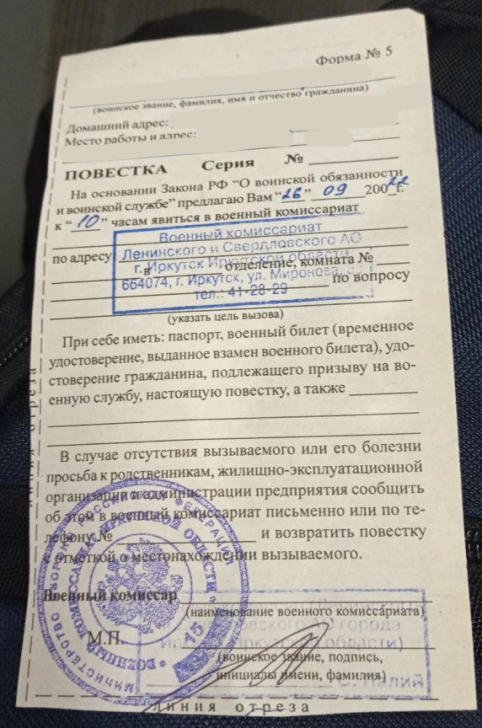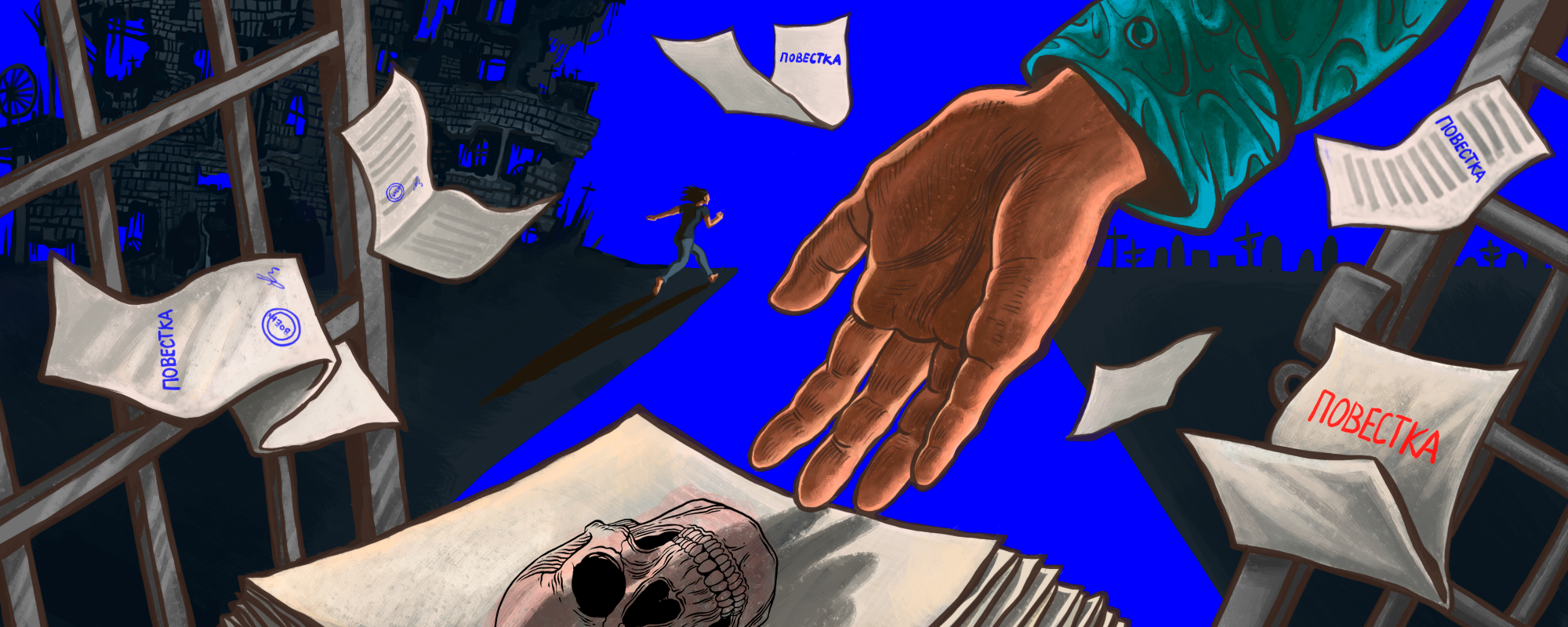After the mobilization was announced, protests erupted in dozens of Russian cities. According to our data, between September 21 and 24, 2 402 people were detained. In many police stations in Moscow and in some police stations in the regions, policemen served call-up papers to detained men; in some known cases those call-up papers were not directing them to the correct draft centers where these men were registered.
On September 21, policemen served call-up papers to detainees in Voronezh and at 16 different police stations in Moscow. On September 24, the same happened in 10 police stations in Moscow, as well as in Irkutsk, Arkhangelsk, Samara, Ryazan, Nizhny Novgorod, Saratov, and Smolensk.
The head of Russia Today, Margarita Simonyan stated that over 200 participants of the anti-war protest on Arbat street in Moscow on September 21 were served call-up papers to come to draft centers. In the opinion of the press-secretary of Vladimir Putin, Dmitry Peskov, calling up protesters to draft centers is «not against the law». According to Baza, in Moscow the police are checking all men that they come in contact with against the lists of men to be mobilized; this applies not only to those who are detained, but also to the men who come to police stations for other reasons.
OVD-Info has spoken with several detainees, and they reconunted cases when they were indeed served call-up orders at police stations.
Two hours to get ready
Vitaly Tsitsurov from Smolensk is a known activist in his town, regularly organizing pickets for peace with Ukraine. He says that on September 21 and 24, when protests against the mobilization took place across Russia, he experienced issues with internet access at his house. Both times he came across policemen on his way out of the building.
On September 21, he was requested to come to the police station. There Tsitsurov was questioned in connection to his recent complaint of unlawful actions—at one of the protests the activist was attacked. On September 24, the policemen served him the call-up papers ordering him to report to the draft center.
«I was met by two lieutenant colonels, a major and someone in civilian clothes. In the call-up papers I was simply ordered to come, without any mention of the reasons. I refused to accept the papers, ” says the activist.
Then he was told to go to the police station, where an act was drafted documenting his refusal to receive the call-up papers, which is an administrative offence (article 21.5 of the Administrative Offenses Code, up to 3000 roubles in fines). After that the policemen returned to the topic of his complaint about the actions of unknown attackers, which Tsitsurov had lodged earlier.
«I did my time in the army a long time ago, I don’t even know where the draft center is now and if the call-up papers pointed to the correct place. I was served the call-up papers at 4 pm, telling me to come to the draft center at 6 pm the same day. In the corner of the paper I saw a note «Team No. …». I don’t know for sure what that meant, maybe it is the number of the unit. When I served 10 years ago there was such a term as «order to depart, ” says Tsitsurov.
Just passing by
«My wife and I were finishing a carsharing ride, I parked at the nearest metro station where we found a parking space, ” Maksim from Moscow is telling the story of how he got detained by the police on September 24 in the city center. «We walked up to the metro station, crossed the first pedestrian crossing and noticed two law enforcement officers standing there in their black uniforms with helmets. We stopped at the next crossing, waiting for the green light to cross. They approached me from the back, grabbed me by my arms and walked me to the police car.»
Maksim’s wife, who was trying to ask the policemen for the reasons why her husband was being arrested, was also detained but put in a different police wagon. Maksim says that his overcrowded police wagon was driving around Moscow for an hour and a half looking for a police station that could accommodate the detainees. In the end, they were taken to Severnoye Tushino, while his wife was taken to the police station in Novokosino.
The woman was charged with an offense under part 5 of article 20.2 of the Administrative Offenses Code (violation of the established procedure for holding a demonstration) and was released, because this charge only leads to a fine. But Maksim was charged under article 20.2.2 of the Administrative Offenses Code (violation of the established procedure for holding a demonstration, resulting in obstruction of traffic). This article presupposes administrative arrest, so he was left to spend the night at the police station.
«After the detention protocols were drafted at the police station, me and one more guy were told to come and wait in the corridor. This was around half past three in the night. A woman who distributes military call-up papers was called to the police station. She said that she works at the draft center, but she did not show any identification to prove that. She gave us the call-up papers. The policemen insisted that we needed to accept them and said that otherwise our case would not move along, ” says Maksim.
The next day Maksim was taken to court and told to pay a fine. The call-up order was for October 10, allowing enough time in case he was arrested for 15 days. According to the call-up papers, he would need to come to one of the draft centers in Moscow, even though his military registration is in another region.
Call-up orders instead of detention protocol
A student from a university in Irkutsk, Dimitri, was detained on September 24. He says that he was detained quite far from the place where the anti-war protest took place, but he was still searched and taken to the police station.
«At the entrance to the police station there was a box, and I was told to put my phone in there, after which the box was locked. I was sitting on a bench in front of the office of the district police officer together with the other detainees. They took a photo of me and took my fingerprints. They were asking me whether I was ashamed to take part in such demonstrations or not, ” says Dimitri.
Then the operative took Dimitri’s phone out of the box and started browsing through its contents. There were only WhatsApp and Vkontakte on his phone, no other messaging apps, so the policemen did not find anything suspicious. Dimitri managed to leave the police station without a detention protocol, but with call-up papers ordering to report to the draft center on September 27.
«Three policemen came in, told all the men to come forward. They took record of the passport numbers and registration addresses, then ordered the men to sign the call-up papers. I was telling them that the call-up papers that they were asking me to sign contained directions to the wrong draft center, not the one where I am registered. They ignored this and continued to tell me to sign it. I agreed, ” says the detainee.
Dimitri did not go to the draft center in the end, neither at the place of registration, nor in Moscow. He was also unable to get an appointment at his university’s military registration desk because of a long queue there.

Another person OVD-Info has spoken with, the mother of one of the men detained in Moscow, says that her son did go to the draft center with a call-up order received after the protest, but was told there that he was not eligible for the mobilization. He was told in the military commissariat that, as a student, he would not be mobilized.
According to a representative of the Coalition of lawyers and experts of Russian human rights organizations that deal with the conscious refusal to take part in military service (he asked to stay anonymous), policemen can only serve call-up orders when a draft center has specifically requested this to be done for a specific person.
Moreover, the person who has been served the call-up papers should be called to the specific draft center where he is registered, not to any random draft center as it was done in the cases of the protest detainees described above. According to the Coalition’s expert, such practices are most likely aimed at intimidating protesters, in order to deter them from protesting.
At the same time, the police and the draft centers may be aiming to achieve the real goal of sending people to war. Hypothetically, they can claimthat the person lives in the region where their call-up papers were served, but without registration; then they can quickly register him there and mobilize him.
In view of the obvious unlawfulness of such actions, the Coalition representative advises to ignore call-up orders served this way.
Media team OVD-Info



